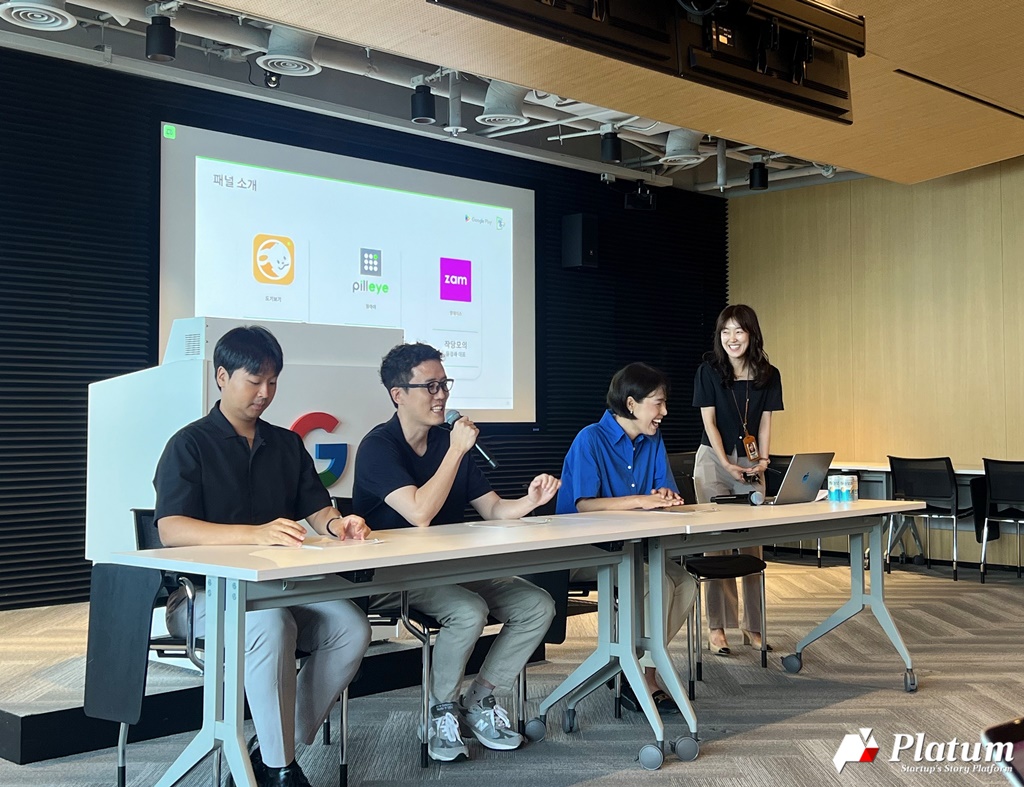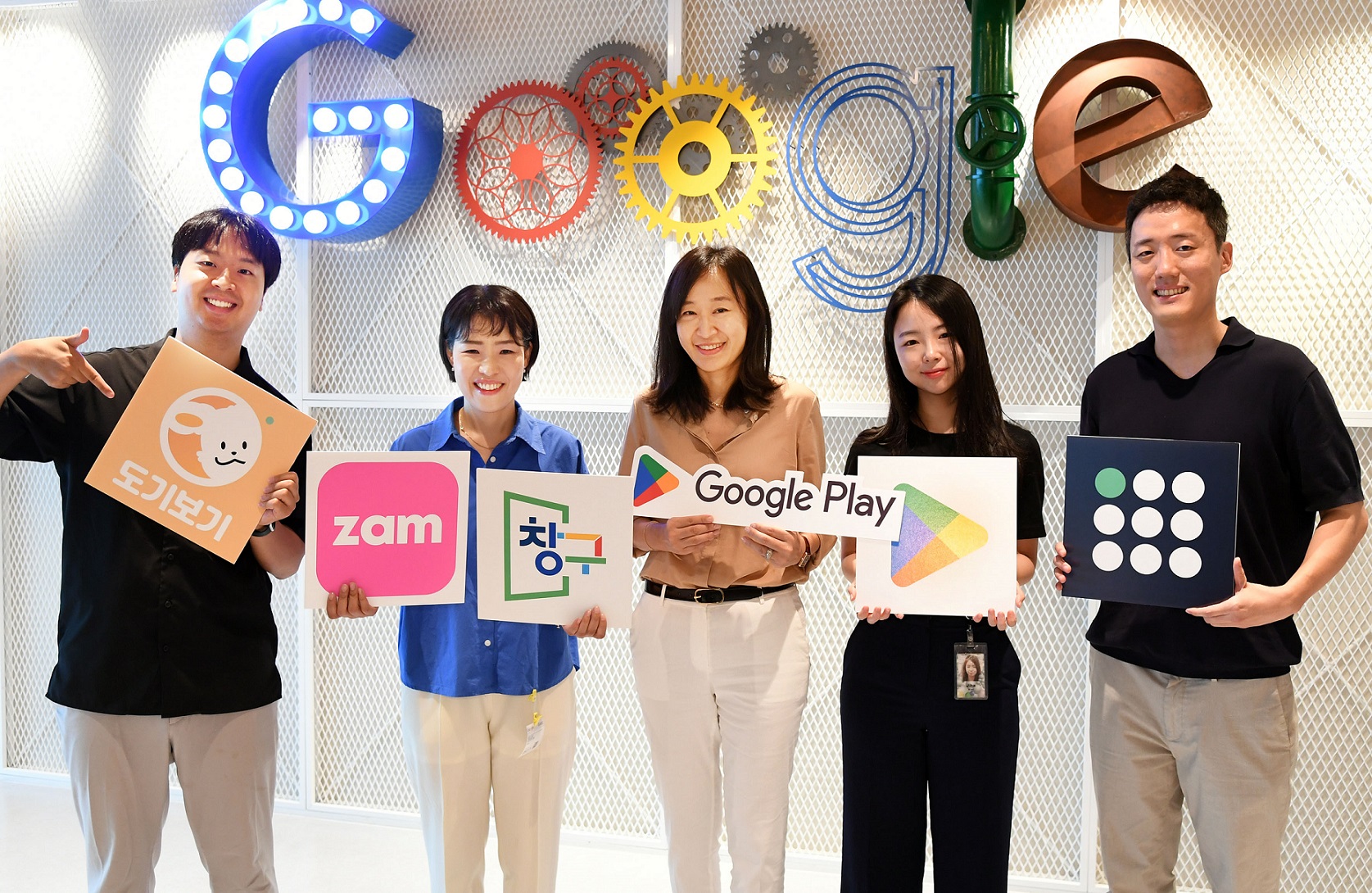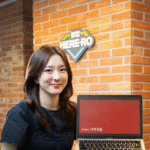
On the 17th, Google Korea hosted the 5th Media Roundtable for the Google ChangGoo(구글 ‘창구’) Program. The event showcased selected startups and the achievements of Google’s ChangGoo, a training and mentorship program for startups.
Named after the Korean words “Chang-eob” (foundation in English) and “Google Play” (Chang+Goo), the ChangGoo program is a collaboration between Google, the Ministry of SMEs and Startups, and the Korea Institute of Startup and Entrepreneurship Development to support the growth of Korean mobile app and game startups. This year, the program added 20 more participating companies than last year, bringing the total number of developers supported to 100. The program has been recognized within Google and is being benchmarked in other countries such as India.
“We’ve been supporting startups through the ChangGoo program for five years,” said Kyung-Ja Shin, senior director of marketing at Google Korea. “When we launched the program in 2019, our vision was to become a ‘window’ for Korean developers to expand overseas,” Kyung-Ja Shin said. “The companies we’ve worked with have achieved remarkable results. By the fourth year of the program, the number of new app downloads had increased by 140 percent, developer revenue by 62 percent, developer team size by 41 percent, and overseas expansion by more than 69 percent, with a cumulative investment of 118 billion won ($88.2 million),” she said.
Google Korea will provide a total of 100 companies selected for the fifth year of the ChangGoo program with various programs to strengthen their business capabilities and support their overseas expansion. These include seminars to support startup growth, in-depth one-on-one consulting for global business, and increased opportunities to participate in demo days to support investment from a number of venture capital (VC) firms. This year, Google Korea will work with Google for Startups programs in Japan to help them strengthen their overseas capabilities.
Kyung-Ja Shin, Senior Director of Marketing at Google Korea, said, “We are planning a program for outstanding Korean developers to meet and interact with Japanese venture capitalists, startups and experts. We plan to run various growth support programs to help Korean developers grow and go overseas”.
At the event, Petpeotalk, the developer of Dogibo, an AI-based pet behavior analysis solution, Medility, the operator of Pilleye, an AI pill counter, and Zackdang Company, the operator of Zamface, a beauty video curation platform, introduced their businesses and shared their experiences and expectations of growing with Google.
Jeong-ha Yoon, CEO of Zackdang Company, said, “We operate a platform that combines AI technology and beauty. We have about 3.5 million cumulative users in Korea and aim to expand to Southeast Asia, including Vietnam, in the future, so we applied to the ChangGoo program and received a lot of support.”
Sang-eon Park, CEO of Medility – Pilleye “ChangGoo is the best program for early stage startups in Korea. Just being selected gives us credibility with our partners and allows us to use Google’s infrastructure for business expansion, advertising and marketing.
Ryun Hwan Kwon, CEO of Petpeotalk – Dogibo, said, “Our main motivation for applying to the ChangGoo program is to enter the North American market. We have completed the first round of validation in Korea, so we need to expand globally. Through the ChangGoo program, we hope to accelerate our overseas expansion.
(Q&A with the three startups below)

Q. What motivated you to apply for the ChangGoo program? What do you hope to gain from the program?
Jeong-ha Yoon, CEO of Zackdang Company (hereinafter “Yoon”): ChanGoo is a popular program for domestic startups. We applied for the program because we thought it would be very helpful for us to expand overseas. It’s not easy for small startups to expand overseas, but with Google’s help, we expect to achieve significant results.
Sang-eon Park, CEO of Medility (hereinafter “Park”) : I applied for the program because I thought it would be helpful for early-stage startups. Just being selected for the program gives us credibility with our business partners, and we expect that using Google’s infrastructure will help us scale.
Ryun Hwan Kwon, CEO of Petpeotalk (hereinafter “Kwon”): The concern for pets is the same around the world. Now that we have completed the first round of verification in Korea, we need to expand globally. Through the ChangGoo program, we want to accelerate our overseas expansion.
Q: Three companies here are providing unique services using AI. How do you use them?
Yoon: We implemented various functions according to customer needs. There was a lot of demand from users for skin diagnosis. Most people categorize skin conditions as oily, dry, and combination, but Zamface divides skin types into 64 categories and correlates them with cosmetics on the market. AI and AR capabilities were needed to properly implement the service.
Park: From the very beginning, we actively used AI to develop the service. Counting pills in pharmacies in Korea and other countries is a huge task. It is important that the medicine is administered to the patient exactly as prescribed, so it has to be accurate. However, the pain point has been that the verification process relies on human eyes and hands. Medility solves the problem by applying vision AI technology to Pilleye.
Kwon: In general, when we leave our pets, we often use home cams and pet cams. It has the advantage of being able to monitor them in real time, but realistically, it’s hard to keep an eye on them. There are many cases where you miss your pet’s movements, and there are many cases where your pet behaves strangely when you are alone. Our service (Dogibo) is a process that uses AI to record and disconnect only when the pet moves, like a black box. By identifying the path your pet takes, you can get a closer look at where they spend a lot of time, how much they eat, and how much they howl or bark. You can then graph this activity and compare it on a daily, weekly, and monthly basis.
Q. The process of integrating AI must have been challenging.
Kwon: First of all, data collection and processing is difficult. In our case, there are users who are uncomfortable with the information collection part. Even though it is a technical mechanism that only records animals, there is a misunderstanding. We are appealing to safety and usefulness in different ways to resolve this. I think it will be resolved by completing the service and providing more valuable services.
Park: We launched the Pilleye app in November 2020, and it’s now available in 230 countries around the world. In the two and a half years of operation, we have encountered many situations. Because of the importance of medicine, users want the technology to be more than 99.9% accurate. We’ve been working on the quality of our data set to ensure that we can continue to maintain 99.9% accuracy with a growing number of users and different environments. If we can’t maintain accuracy, there’s no reason for the service to exist. So we are constantly testing new AI models and improving our MLOps to learn effectively from real data.
Yoon: As with any company using AI, the biggest challenge is training a large amount of data. As a startup with limited resources, the process of finding efficiency is also challenging. If we don’t get the results we expect, we keep changing directions and trying to find the right one.
Q. User feedback often determines the direction of the service. What kind of feedback do you remember?
Kwon: Dogibo is a very different service from pet cams and things like that. So we get a lot of feedback from users saying, “It’s nice to be able to do something for my pet through our service. When I get feedback like that, it makes me really proud and determined to do better.
Park: One of the things that stands out in my mind is how pharmacists in North America described our app as a “life saver” in a short but powerful way. I’m also grateful for the feedback from Korean community and hospital pharmacies who say, “Thank you for saving me from working overtime. The most rewarding feedback we received was from pharmacists who said they were able to focus more on patient care because they had fewer mundane and repetitive tasks. That is exactly the kind of feedback we were looking for.
Yoon: Google Play reviews are probably the most accurate indicator of how many users are responding. In fact, the process of building a service like Zamface is very difficult and laborious. However, positive feedback from users is what drives us forward. Sometimes I see users using our app on the subway during my commute to work, and even though I can’t show it, I feel very happy and rewarded.
Q. What do you think about the future of AI in Korea?
Yoon: I think AI will become more integrated into our lives in the future. I think it will accelerate as startups in various fields solve customer inconveniences one by one. Zackdang will also provide services that are more relevant to consumers, based on the data we have collected from our overseas expansion. We hope that our service (Zamface) will become a meaningful example of the use of AI in the beauty industry.
Park: If the barriers to AI technology are lowered, it will be difficult to find a field that does not use AI in real life. I think the technology is a means, not an end. The role of AI technology should be to enable humans to perform better.
Kwon: I think AI technology will evolve to help people with their problems much more directly. Until last year, AI was considered a specialized field, and the general public was not very interested in it, but now Google Bard and Open AI’s Chat GPT are providing direct convenience in everyday life. The technology of using AI chatbot agents is one of the many ways to use AI. In the next one to two years, there will be many applications that utilize AI in Korea, and some of them will be the ones that dominate the domestic and international markets. We believe our service will be one of them.


![[스타트업 탐방] 오후 5시, 자리는 비었지만 일은 계속되는 회사… 하이퍼커넥트 DSCF6818](https://platum.kr/wp-content/uploads/2025/11/DSCF6818-150x150.jpg)
![[BLT칼럼] 엔젤투자의 3가지 즐거움 1114b3aee2b12](https://platum.kr/wp-content/uploads/2025/11/1114b3aee2b12-150x150.png)
![[중국 비즈니스 트렌드&동향] 스타벅스 중국 사업 지분 60% 매각 20230510_133701](https://platum.kr/wp-content/uploads/2025/11/20230510_133701-150x150.jpg)

댓글 남기기